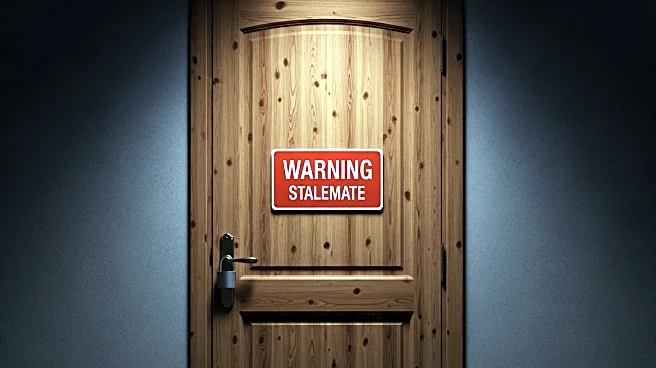What is the story about?
What's Happening?
House Speaker Mike Johnson has warned that the current federal government shutdown could become the longest in U.S. history. The shutdown, which has halted routine government operations and affected cultural institutions and airports, is primarily driven by a stalemate over health care policy. Democrats are demanding the extension of Affordable Care Act subsidies, which are set to expire, while Republicans argue that the issue can be addressed later. Johnson has refused to negotiate until Democrats agree to reopen the government. President Trump has ensured that military personnel are paid, removing a significant pressure point in negotiations.
Why It's Important?
The ongoing shutdown has significant implications for the U.S. economy and public services. With government operations halted, there is increased uncertainty in an already precarious economic environment. The expiration of health care subsidies could lead to skyrocketing insurance premiums for millions of Americans, impacting their access to affordable health care. The shutdown also affects government workers, who may go without paychecks, further straining household finances. The situation underscores the deep political divide over health care policy, a persistent issue since the Affordable Care Act's inception.
What's Next?
As the shutdown continues, the end of October is seen as a potential deadline for reopening the government. Open enrollment for health insurance begins on November 1, adding urgency to the negotiations. If Congress fails to renew the subsidy payments, monthly insurance costs could double, affecting millions of Americans. The shutdown's resolution will depend on whether Democrats and Republicans can reach a compromise on health care policy. Meanwhile, the Trump administration is using various funding sources to mitigate the shutdown's impact on military personnel and other priorities.
Beyond the Headlines
The shutdown highlights the ongoing challenges in U.S. health care policy and the political complexities surrounding the Affordable Care Act. The deep-rooted nature of Obamacare makes its repeal and replacement unlikely, as noted by Speaker Johnson. The situation also raises ethical questions about the prioritization of funding during a shutdown, with certain groups receiving pay while others face financial uncertainty. The long-term implications could include shifts in public opinion on health care policy and government spending priorities.
















